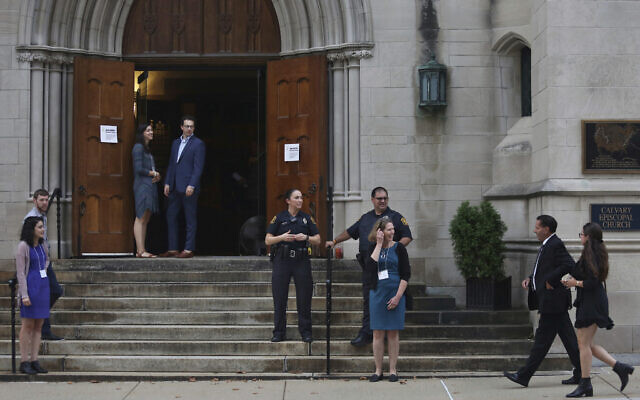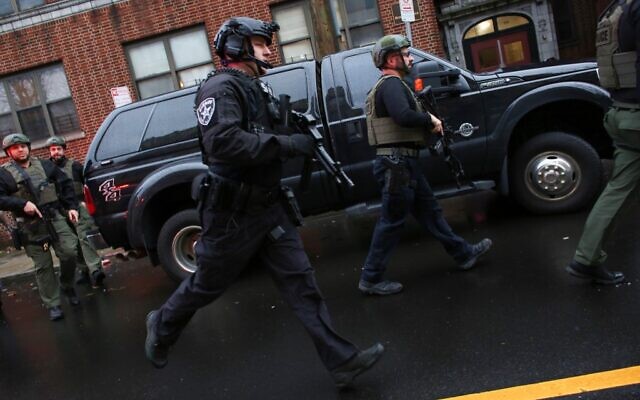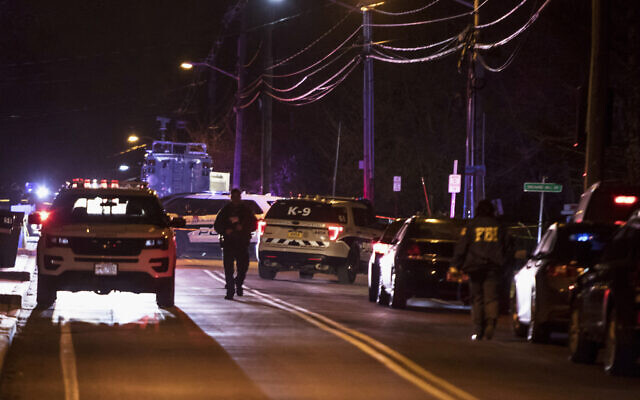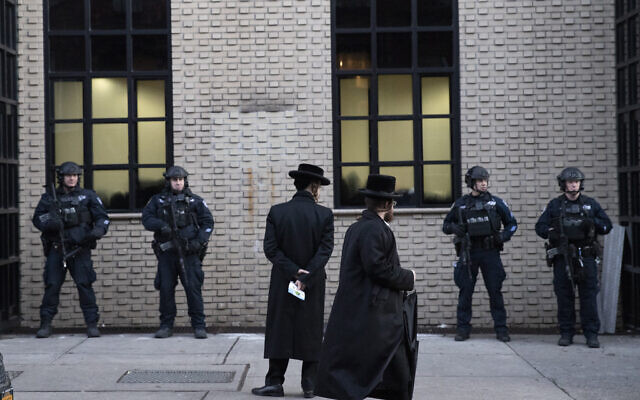
Security officials say Jewish centers should employ uniformed law enforcement officers rather than private guards or volunteers from community in wake of deadly attacks
By DAVID CRARY 15 January 2020, 10:21 pm
NEW YORK (AP) — Jewish congregations opting to deploy armed security personnel in the wake of deadly attacks on synagogues should — if possible — use uniformed law enforcement officers rather than private guards or volunteers from the community, a group of security experts recommended Wednesday.
The advice came in a detailed, first-of-its-kind report compiled by the Secure Community Network in response to questions from Jewish communities across the United States as to whether and how they should make use of armed security. The network, founded in 2004 by a coalition of Jewish organizations, describes itself as “”the official safety and security organization” of the Jewish community in North America.
Michael Masters, the network’s national director, said security-related worries among American Jews have intensified since the October 2018 massacre at the Tree of Life synagogue in Pittsburgh, where 11 people were killed. Last year, in another attack blamed on anti-Semitic hatred, one worshipper was killed at a synagogue in Poway, California.
Work on the new security report began six months ago; two subsequent attacks in December further fueled the sense of alarm.

In Jersey City, New Jersey, a man and woman killed a police officer and then stormed into a kosher grocery, fatally shooting three people before dying in a gunfight with police. The slayings happened in a neighborhood where Hasidic families had recently been relocating.
In Monsey, New York, a man rushed into a rabbi’s home during a Hanukkah celebration, hacking at people with a machete. Five people were wounded.
One major consequence of the attacks, Masters said, is that pleas for synagogues to remain gun-free are fading as more Jews accept the need for armed security.
“We are facing generally well-armed, often highly motivated individuals who are intent on taking life,” Masters said. “Our safety and security personnel need to be in a position to do their job well.”
The new report stresses that there is no one-size-fits-all answer when it comes to security and firearms policies for synagogues and Jewish organizations.
“Introducing firearms into a facility is a decision to be made carefully and must be part of a broader security strategy,” says Masters. “There are countless considerations, and if organizations overlook them, they may put their congregants at risk.”

If a congregation decides to have an armed presence at its synagogue, the report cited various options — uniformed or plainclothes on-duty police officers, off-duty or retired officers, current or former members of the military, private security contractors or volunteer armed congregants.
The best option, the report said, would be uniformed on- or off-duty law enforcement officers or recently retired officers who are up to date with certifications and training.
Private security personnel or people deployed because of military backgrounds are likely to lack the specialized training in civilian security that police officers receive, the report said.
Volunteers from the congregation could be considered a possible “last resort” in event of attack, the report said. It warned that they are likely to lack experience and training in confronting high-stress situations and deciding whether to use lethal force.
The report also cautions that use of armed personnel other than law enforcement officers can raise thorny legal questions — for example, in cases when a shooting was determined to be unjustified or negligent, or when physical restraints are used on a suspected assailant.
The experts urged congregations to carefully consider the long-term costs of armed security, so it could be made a core part of the synagogue’s operations budget rather than a special expense that might be difficult to sustain over time.

“If the source of the funding runs out, the congregation will be confronted with difficult decisions,” the report said. “If the funding for the armed security comes from one individual or group of individuals, they are likely to feel empowered to set the terms of how the security is provided and what the employed individuals are required to do, creating a potential source of conflict.”
In a section of the report titled “Beware, Things Can Go Wrong,” the experts noted that synagogues may face potentially violent threats that aren’t fueled by anti-Semitic hatred, including incidents involving an emotionally disturbed person.
“How would an armed congregant determine whether a belligerent passerby, including someone with a mental health issue, is actually a security threat?” the report asks. “Communities are best served by security personnel who are trained for the full spectrum of responses to a range of threats.”